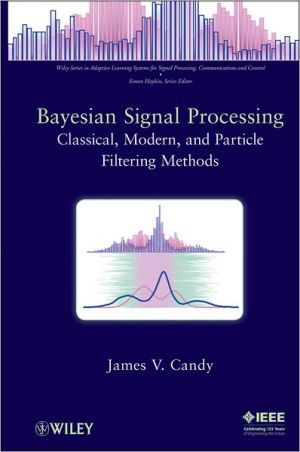

 |

|

Sold Out
Book Categories |
Preface.
References.
Acknowledgments.
1. Introduction.
1.1 Introduction.
1.2 Bayesian Signal Processing.
1.3 Simulation-Based Approach to Bayesian Processing.
1.4 Bayesian Model-Based Signal Processing.
1.5 Notation and Terminology.
References.
Problems.
2. Bayesian Estimation.
2.1 Introduction.
2.2 Batch Bayesian Estimation.
2.3 Batch Maximum Likelihood Estimation.
2.4 Batch Minimum Variance Estimation.
2.5 Sequential Bayesian Estimation.
2.6 Summary.
References.
Problems.
3. Simulation-Based Bayesian Methods.
3.1 Introduction.
3.2 Probability Density Function Estimation.
3.3 Sampling Theory.
3.4 Monte Carlo Approach.
3.5 Importance Sampling.
3.6 Sequential Importance Sampling.
3.7 Summary.
References.
Problems.
4. State-Space Models for Bayesian Processing.
4.1 Introduction.
4.2 Continuous-Time State-Space Models.
4.3 Sampled-Data State-Space Models.
4.4 Discrete-Time State-Space Models.
4.5 Gauss-Markov State-Space Models.
4.6 Innovations Model.
4.7 State-Space Model Structures.
4.8 Nonlinear (Approximate) Gauss-Markov State-Space Models.
4.9 Summary.
References.
Problems.
5. Classical Bayesian State-Space Processors.
5.1 Introduction.
5.2 Bayesian Approach to the State-Space.
5.3 Linear Bayesian Processor (Linear Kalman Filter).
5.4 Linearized Bayesian Processor (Linearized Kalman Filter).
5.5 Extended Bayesian Processor (Extended Kalman Filter).
5.6 Iterated-Extended Bayesian Processor (Iterated-Extended Kalman Filter).
5.7 Practical Aspects of Classical Bayesian Processors.
5.8 Case Study: RLC Circuit Problem.
5.9 Summary.
References.
Problems.
6. Modern Bayesian State-Space Processors.
6.1 Introduction.
6.2 Sigma-Point (Unscented) Transformations.
6.3 Sigma-Point Bayesian Processor (Unscented Kalman Filter).
6.4 Quadrature Bayesian Processors.
6.5 Gaussian Sum (Mixture) Bayesian Processors.
6.6 Case Study: 2D-Tracking Problem.
6.7 Summary.
References.
Problems.
7. Particle-Based Bayesian State-Space Processors.
7.1 Introduction.
7.2 Bayesian State-Space Particle Filters.
7.3 Importance Proposal Distributions.
7.4 Resampling.
7.5 State-Space Particle Filtering Techniques.
7.6 Practical Aspects of Particle Filter Design.
7.7 Case Study: Population Growth Problem.
7.8 Summary.
References.
Problems.
8. Joint Bayesian State/Parametric Processors.
8.1 Introduction.
8.2 Bayesian Approach to Joint State/Parameter Estimation.
8.3 Classical/Modern Joint Bayesian State/Parametric Processors.
8.3.1 Classical Joint Bayesian Processor.
8.3.2 Modern Joint Bayesian Processor.
8.4 Particle-Based Joint Bayesian State/Parametric Processors.
8.5 Case Study: Random Target Tracking using a Synthetic Aperture Towed Array.
8.6 Summary.
References.
Problems.
9. Discrete Hidden Markov Model Bayesian Processors.
9.1 Introduction.
9.2 Hidden Markov Models.
9.3 Properties of the Hidden Markov Model.
9.4 HMM Observation Probability: Evaluation Problem.
9.5 State Estimation in HMM: The Viterbi Technique.
9.6 Parameter Estimation in HMM: The EM/Baum-Welch Technique.
9.7 Case Study: Time-Reversal Decoding.
9.8 Summary.
References.
Problems.
10. Bayesian Processors for Physics-Based Applications.
10.1 Optimal Position Estimation for the Automatic Alignment.
10.2 Broadband Ocean Acoustic Processing.
10.3 Bayesian Processing for Biothreats.
10.4 Bayesian Processing for the Detection of Radioactive Sources.
References.
Appendix A. Probability & Statistics Overview.
A.1 Probability Theory.
A.2 Gaussian Random Vectors.
A.3 Uncorrelated Transformation: Gaussian Random Vectors.
Referencess.
Login|Complaints|Blog|Games|Digital Media|Souls|Obituary|Contact Us|FAQ
CAN'T FIND WHAT YOU'RE LOOKING FOR? CLICK HERE!!! X
 You must be logged in to add to WishlistX
 This item is in your Wish ListX
 This item is in your CollectionBayesian Signal Processing: Classical, Modern and Particle Filtering Methods
X
 This Item is in Your InventoryBayesian Signal Processing: Classical, Modern and Particle Filtering Methods
X
 You must be logged in to review the productsX
 X
 X

Add Bayesian Signal Processing: Classical, Modern and Particle Filtering Methods, New Bayesian approach helps you solve tough problems in signal processing with ease Signal processing is based on this fundamental concept—the extraction of critical information from noisy, uncertain data. Most techniques rely on underlying Gaus, Bayesian Signal Processing: Classical, Modern and Particle Filtering Methods to the inventory that you are selling on WonderClubX
 X

Add Bayesian Signal Processing: Classical, Modern and Particle Filtering Methods, New Bayesian approach helps you solve tough problems in signal processing with ease Signal processing is based on this fundamental concept—the extraction of critical information from noisy, uncertain data. Most techniques rely on underlying Gaus, Bayesian Signal Processing: Classical, Modern and Particle Filtering Methods to your collection on WonderClub |